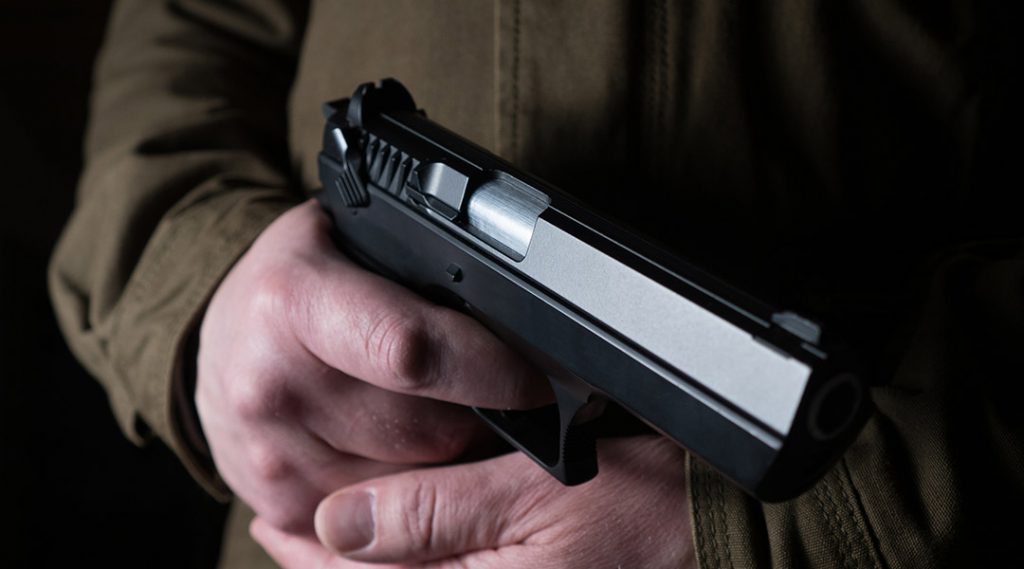Firearm Possession With a Domestic Violence Conviction
Michigan’s Controversial Approach to Gun Control: Protecting or Overreaching? Possession of a Firearm by Someone Conviction of Domestic Violence is a Five (5) Year Felony

Possession of a Firearm by a Person Convicted of Domestic Violence
In a move that has sparked intense debate, Michigan passed a law in 2023 restricting gun ownership by domestic violence offenders. While the intent was to enhance public safety, this legislation raises significant concerns about governmental overreach and the potential infringement on Second Amendment rights. The sponsors of the law wrongfully assume everyone convicted of domestic violence is a criminal and a danger to the community. The defense lawyers with LEWIS & DICKSTEIN, P.L.L.C. will fearlessly fight to protect clients charged with firearm possession by someone with a domestic violence conviction.
The Law and Penalties
Anyone who possesses, uses, owns, transfers, sells, or purchases a firearm within eight (8) years of a domestic violence conviction, release from probation or jail, or payment of fines, is guilty of a felony punishable by up to five years of prison and probation, fines, and costs. Along with the potential of incarceration and probation, this felony conviction carries the potential of a lifetime ban on firearm possession and a loss of various other civil rights. Additionally, a felony conviction has indirect consequences such as damaged reputation, difficulty in finding or maintaining employment, inability to obtain a security clearance, loss or inability to obtain a professional license, elimination of public assistance, custody disputes, immigration issues such as deportation, and more.
If someone with a domestic violence conviction possesses, uses, owns, transfers, sells, or purchases a firearm within eight (8) years of their sentencing, release from probation or jail, or payment of fines, whichever is later, they are guilty of a five (5) year felony.

Defense Against Charges of Possession of a Firearm by a Person Convicted of Domestic Violence
There is a defense to every case. Sometimes, the defense is that the defendant is not guilty because they did not possess a firearm or does not have a domestic violence conviction. In other cases, the defense will be self-defense, necessity, duress, mistaken identity, malicious accusation, etc. Suppose there is overwhelming, undisputable evidence of guilt. In that case, the defense can present equitable or mitigating facts and negotiate a reduction or dismissal of the charges or a lenient sentence. The defense lawyers with LEWIS & DICKSTEIN, P.L.L.C. have persuaded prosecutors in courts throughout Michigan to dismiss charges, reduce them, or take them under advisement, thereby avoiding a conviction.
Additionally, they have extensive expertise in convincing judges to focus on rehabilitation rather than punishment at sentencing. Our highest priority is seeking full, outright dismissal of charges when possible. If that is not practicable, we will do whatever it takes to achieve the best possible outcome.
What is a domestic violence conviction for the felony firearm law?
Domestic violence includes any conviction of one of the following offenses, so long as they involve people who are or were in a dating relationship, spouses, or those with a child in common:
- Domestic Assault and Battery
- Aggravated Domestic Violence
- Breaking and Entering
- Vulnerable Adult Abuse
- Malicious Destruction of Property
- Malicious Destruction of a Home or Building
- Stalking and Cyberstalking
- Poisoning

The Fine Line of the New Legislation
According to Michigan lawmakers, the law prohibits individuals convicted of domestic violence from owning firearms for eight years post-sentence. While intended to protect, this extended duration raises questions about the balance between public safety and individual rights. The law is overbroad because it (1) does not distinguish between first-time offenders and habitual criminals, (2) does not permit someone to demonstrate that they are not a danger, and (3) doesn’t account for people who need to possess firearms for employment or personal safety.
Debate and Controversy Over the Law Prohibiting Firearm Possession After a Domestic Violence Conviction
Republican lawmakers argued the law is overly broad and may unjustly strip law-abiding citizens of their constitutional rights. Proponents emphasized the focus on domestic violence. The expanded scope to include non-violent misdemeanors and felonies is troubling to many. The danger of this law is that it criminalizes defendants who are not a risk, contribute to their community, and thus jeopardizes their ability to protect themselves and their loved ones.

Your Best Defense to Felony Charges for Those Conviction of Domestic Violence
While the intention behind Michigan’s new gun legislation may be to safeguard the public, particularly survivors of domestic violence, the broad sweep of this law and its potential impact on non-dangerous misdemeanants brings into question the balance between safety and the erosion of Second Amendment rights. This law stands at the crossroads of public safety and personal freedom, highlighting gun control legislation’s complex, often contentious nature.
The Defense Team with LEWIS & DICKSTEIN, P.L.L.C. has decades of experience defending clients against all state and federal firearms charges, including felony charges such as Possession of a Firearm by a Person Convicted of Domestic Violence. Our unique team approach consistently provides our clients with the highest caliber of defense and extraordinary results. You are in the right place if you want someone who will fearlessly and loyally fight to protect and defend you. Call us for a free consultation. We will take the time to talk with you, answer your questions, and work with you to develop a winning strategy!
Call us today at (248) 263-6800 for a free consultation or complete an online Request for Assistance Form. We will contact you promptly and find a way to help you.








